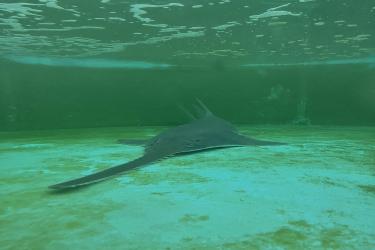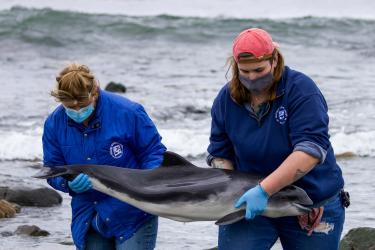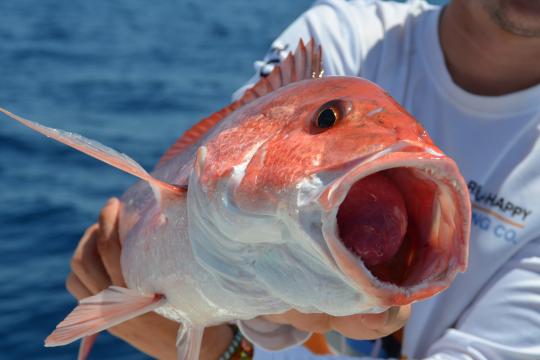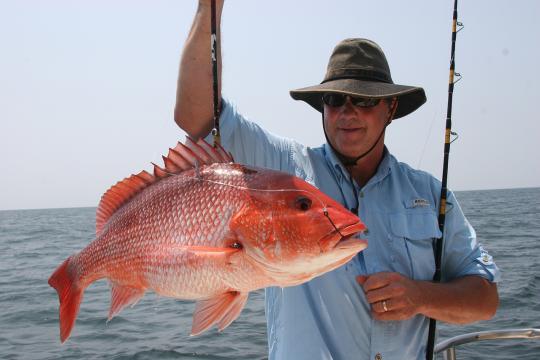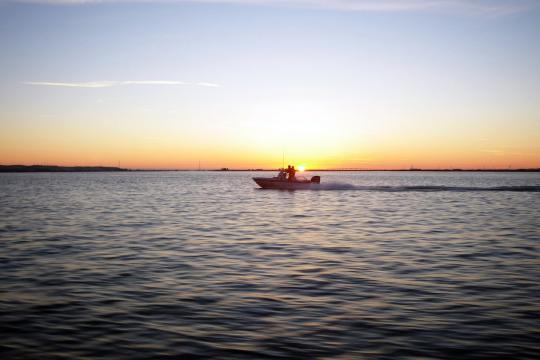KEY MESSAGES:
- NOAA Fisheries is requesting comments on a proposed rule, which if implemented, would modify reporting requirements for the owners or operators of vessels with Charter Vessel/Heaboat permits for Gulf of Mexico (Gulf) reef fish or Gulf coastal migratory pelagic permits.
- The original comment period was scheduled to close on November 26, 2018. The comment period is being extended until January 9, 2019.
- NOAA Fisheries is extending the comment period to allow those impacted by Hurricane Michael on October 10 the opportunity to comment on the proposed rule.
- The Gulf of Mexico Fishery Management Council approved the For-Hire Reporting Amendment in an effort to enhance data collection and fisheries management.
- Comments are due by January 9, 2019.
SUMMARY OF PROPOSED CHANGES:
- Require the owner or operator of a vessel with a Gulf for-hire permit to:
- electronically declare (hail-out) a fishing trip before leaving port;
- submit an electronic fishing report for each trip prior to the vessel offloading fish, or within 30 minutes after the end of the trip if no fish are landed; and
- install NOAA Fisheries approved hardware/software with global positioning system (GPS) capabilities that, at a minimum, archives vessel position data and transmits data to NOAA Fisheries.
- Require the GPS portion of the hardware be permanently affixed to the vessel and turned on at all times, unless a power-down exemption is granted.
- This requirement would not preclude the use of GPS devices that provide real-time location data or vessel monitoring systems (VMS).
- Vessel owners and operators of a vessel with a Gulf for-hire permit must comply with these reporting requirements no matter where the vessel is fishing.
HOW TO COMMENT ON THE AMENDMENT AND PROPOSED RULE:
The comment period is open through January 9, 2019. You may submit comments by electronic submission or by postal mail. Comments sent by any other method (such as e-mail), to any other address or individual, or received after the end of the comment period, may not be considered by NOAA Fisheries.
FORMAL FEDERAL REGISTER NAME/NUMBER: 83 FR 54069, published October 26, 2018.
Electronic Submissions: Submit all electronic public comments via the Federal e-Rulemaking Portal.
1. Go to https://www.regulations.gov/docket?D=NOAA-NMFS-2018-0111
2. Enter or attach your comments.
Mail: Submit written comments to Rich Malinowski, Southeast Regional Office, NMFS, 263 13th Avenue South, St. Petersburg, FL 33701.
Frequently Asked Questions
What would the new reporting requirements be?
- The For-Hire Electronic Reporting Amendment would modify data reporting requirements for federally permitted for-hire vessels (charter vessels and headboats) in the Gulf of Mexico (Gulf) to:
- Declare (hail-out) the type of trip (for-hire or other) prior to departing for any trip.
- Electronically submit trip-level reports prior to off-loading fish at the end of each fishing trip. Previously, electronic reports were submitted by headboats on a weekly basis and charter vessels were only required to report if selected by NOAA Fisheries.
- Use hardware and software with global positioning system (GPS) capabilities that, at a minimum, archive vessel position data during a trip.
- Hail-out: Prior to departing for any trip, the owner or operator of a vessel issued a federal charter vessel/headboat permit for Gulf reef fish or Gulf coastal migratory pelagics would be required to declare the type of trip (e.g., for-hire or other trip). When departing on a for-hire trip they would be required to include the expected return date, time, and landing location.
- Landing Reports: Reports would include information about catch and effort, and economic information during the trip. The owner or operator would be required to submit an electronic fishing report using hardware and software that meets NOAA Fisheries technical requirements and has been approved by NOAA Fisheries.
- Location Tracking and Reporting: Federally permitted for-hire vessels would be required to possess a GPS permanently attached to the vessel that is capable, at a minimum, of archiving GPS locations. This requirement would not preclude the use of GPS devices that provide real-time location data, such as vessel monitoring systems (VMS).
Why are the new requirements necessary?
- Trip level reporting would allow better monitoring of recreational annual catch limits, which would be expected to provide more timely and efficient management of recreational fishing seasons.
- The trip-level reporting would help improve population assessments by providing a more accurate record of for-hire vessel landings and data associated with the fishing locations.
- The new system would provide a history of landings for each vessel, which could help improve economic analyses for proposed Gulf of Mexico Fishery Management Council actions.
- The data could also be used in determining the costs of seasonal closures and disasters such as hurricanes or red tide events.
- Hail-outs and tracking devices are expected to provide better data on fishing effort (number of trips) and allow for better enforcement of fishing regulations.
Who would be required to submit fishing records electronically?
- Owners or operators of vessels that have a federal Gulf Charter Vessel /Headboat permit for Reef Fish or a Gulf Charter Vessel/Headboat permit for Coastal Migratory Pelagics would be required to submit trip-level electronic reports through NOAA Fisheries approved software and hardware.
- Reporting would be required regardless of where fishing occurs, including other regions and state waters.
- A proposed rule addressing reporting requirements for the owners and operators of federally permitted for-hire vessels in the South Atlantic indicates that if a vessel has both a South Atlantic and a Gulf for-hire permit, the owner or operator could meet the South Atlantic reporting requirement by complying with Gulf requirements. This is intended to reduce duplicate reporting.
What are NOAA Fisheries approved software and hardware?
- Approved hardware could include electronic devices such as computers, tablets, smartphones, and VMS units that allow for internet access and are capable of operating approved software.
- NOAA Fisheries is currently evaluating potential software for the program, including existing software applications already being used by partners in the region.
- Approved hardware and software would be posted on the Southeast Regional Office’s website upon publication of the final rule.
Is a report required if I don’t go fishing?
- If you leave the dock, you would be required to hail-out declaring your trip as a non for-hire trip, for example private recreational fishing or sunset cruise.
- If your vessel remains at the dock, no reporting would be required; the GPS or VMS unit will inform NOAA Fisheries of the vessel’s location.
What if I don’t submit fishing records on time?
- For-hire vessel owners and operators who are delinquent in submitting their reports would be prohibited from continuing to harvest and possess Gulf reef fish or coastal migratory pelagic species, as applicable, until they have submitted all required reports.
- Federal for-hire permits would not be renewed until all required reports are submitted.
- Reporting violations would be subject to NOAA Policy for Assessment of Penalties and Permit Sanctions. http://www.gc.noaa.gov/documents/Penalty%20Policy_FINAL_07012014_combo.pdf.
Why is a tracking device required?
- A vessel tracking device such as a GPS or VMS unit would provide validation of the vessel leaving the dock, and a potential fishing trip.
- Fishing locations provide scientists valuable information that can be used in scientific analysis and population assessments to manage fish stocks and fishing seasons.
What type of GPS device would be required?
- The GPS unit would be required to, at a minimum, archive location information. Real-time devices, such as VMS, could also meet this requirement.
- The GPS or VMS unit must be permanently affixed to the vessel.
- Currently NOAA Fisheries has a list of Type-Approved VMS Units that would be evaluated to determine if these systems meet the new reporting requirements.
- The final rule would provide a list of NOAA Fisheries approved devices.
- A vessel with a commercial reef fish permit is currently required to have a VMS unit. Vessels with both commercial and charter/headboat permits should be able to use the same system for both types of fishing trips. However, VMS units would still need to be evaluated by NOAA Fisheries for approval and vendors would possibly need to upgrade their systems to meet the new reporting requirements.
When would the requirements be effective?
- NOAA Fisheries is designing the new for-hire electronic reporting system, exploring options for hardware and software, and developing outreach materials.
- Upon approval of the final rule, NOAA Fisheries anticipates the system would be ready sometime in 2019. Also, the requirements for hail-outs, fishing reports, and location tracking devices could be implemented at different times.
- The effective dates would be included in the final rule.
Where can I find more information about the amendment?
- The For-Hire Electronic Reporting Amendment is available on line at:
- Any questions regarding reporting requirements should be directed to the Southeast Regional Office, Saint Petersburg, Florida, 727-824-5305.
SIGN UP FOR TEXT MESSAGE ALERTS - FIND OUT ABOUT IMMEDIATE OPENINGS AND CLOSURES
NOAA's Text Message Alert Program allows you to receive important fishery related alerts via text message (SMS). Standard message & data rates may apply. You may opt-out at any time.
Text alerts you may receive include:
Immediate fishery openings and closures
Any significant changes to fishing regulations that happen quicklySign up for one or more of the following groups:
- Gulf of Mexico Recreational Fisheries Related Alerts
- Text GULFRECFISH to 888777
- Gulf of Mexico Commercial Fisheries Related Alerts
- Text GULFCOMMFISH to 888777
- South Atlantic Recreational Fisheries Related Alerts
- Text SATLRECFISH to 888777
- South Atlantic Commercial Fisheries Related Alerts
- Text SATLCOMMFISH to 888777
- Caribbean Fisheries Related Alerts
- Text CARIBFISH to 888777
![]() Join us every other Friday on NOAA Fish Instagram for Rec Fish Friday!
Join us every other Friday on NOAA Fish Instagram for Rec Fish Friday!
Other contacts:
Media: Kim Amendola, 727-551-5707
Allison Garrett, 727-551-5750
